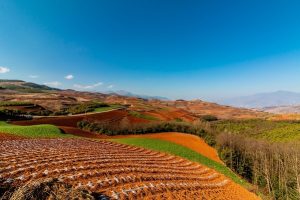
Natural compost is organic matter decomposing and converting into a nutrient-dense soil amendment. It is made from a variety of organic elements, including kitchen leftovers, yard waste, and other biodegradable materials. Composting reduces trash, enriches the soil, strengthens its structure, and promotes healthy plant development.
Studies indicate the various advantages of using natural compost. It is nutrient-dense, giving plants essential elements such as nitrogen, phosphorus, and potassium. It is also beneficial for soil structure improvement, as it enhances aeration, drainage, and water retention.
Natural compost supports a wide range of beneficial microbes that sustain healthy soil ecosystems, making it important for microbial activity. Additionally, it plays a significant role in waste reduction by keeping organic waste out of landfills and lowering methane emissions.
It can also be used as a soil supplement for landscaping and gardens, to improve the soil for potted plants, to increase the fertility of flower and vegetable beds, and more. Thus, utilizing natural compost can enhance gardening and environmental quality while also promoting healthier surroundings.
A variety of natural resources can be used to make organic fertilizer or natural compost. In particular, nitrogen-rich green materials such as coffee grounds, grass clippings, fruit and vegetable scraps, and herbivore manure are required to make natural compost. Carbon-rich brown materials include cardboard, non-glossy paper, wood chips, straw or hay, and dry leaves also used to prepare natural fertilizer, according to the studies.
The most crucial question in this situation is what additional resources are needed to make natural fertilizer or compost?
Haramaya University (HU) College of Agriculture Lecturer and Poultry Farm Coordinator Seid Aragaw said that Ethiopia has a lot of potential for preparing organic compost and fertilizer. However, the country has not taken advantage of this opportunity to conserve the environment and replace imported fertilizers.
He also said that preparing and using natural compost or fertilizers has a long history in Ethiopia. Farmers have been using it for generations, but only recently have higher education institutions started researching and encouraging the community to utilize it.
Several explanations are cited as to why Ethiopia did not use it as early as other countries. One of the causes is that researchers pay little attention to this. It has received little attention, and the number of professionals and institutions involved in this field is too small.
Taking this into consideration, Haramaya University (HU) has prepared natural compost or fertilizer from diverse scraps. To be more specific, the institution created compost from chicken manure and used it for its own consumption as well as to benefit the surrounding populations. Chicken manure, in particular, is a good natural compost element due to its high nutrient content and capacity to improve soil health. Farmers are accustomed to it, and researchers in the field are encouraged to use chicken manure for natural compost preparation.
Compost made from chicken manure contains a lot of nutrients. It is abundant in potassium, phosphorus, and nitrogen, all of which are necessary for plant growth. Additionally, they exhibit microbial activity. Soil aeration, drainage, and moisture retention are all improved by adding compost made from chicken manure. Therefore, composting chicken manure enriches the soil with organic content, supporting thriving plant ecology.
HU has been working on a poultry farm to provide affordable chicken products and ensure food security not only in the surrounding community but also across the country.
Accordingly, it has been preserving and protecting many different kinds of chicken species in the country that can be utilized for meat, feathers, eggs, and other purposes. Additionally, their manure is a valuable resource for the production of natural fertilizers.
However, the nation has not made adequate use of them. Therefore, higher education institutions, including HU’s agricultural research efforts, should be encouraged to bridge the massive gap between the demand and supply of natural fertilizers made from chicken manure.
In actuality, the HU poultry farm was established around the early 1950s and has since engaged in a variety of teaching and learning activities, research, and community engagement endeavors. This, in turn, has made HU successful in preserving, maintaining, and improving chicken breeds for over 50 years, which is crucial for both the local population and the country.
He added that offering courses from undergraduate to doctoral levels is not enough. It is important to carry out research and provide the community with better chicken breeds since poultry farming provides multiple benefits to the community and the country, he underlined. Working with the community helps to improve laying hen performance and chicken meat production as well as provides real-world experience and training.
Apart from providing low-cost chicken products, particularly eggs, to the community, it is also critical to teach the community how to make organic fertilizer out of chicken manure. For example, HU fulfills its responsibility by providing 10 chicks and 10 kg of fodder, as well as comprehensive training, to those in need. These individuals not only benefit from chicken breeding but also create natural fertilizers from chicken manure. This, in turn, enables people to cultivate their backyards.
In general, chicken farming is quite profitable and has several benefits for both the community and the country. As a result, the government has implemented various initiatives, including Ye Lemat Turfat, to ensure national food security. Therefore, it is critical to expand hands-on training, community participation, and strengthen the laboratory system, among other things.
To reap further benefits from poultry farms, not only the government but also relevant organizations should fund poultry farming research and related activities in higher education. They should encourage the use of chicken manure as a natural fertilizer because using chicken manure in natural composting is an efficient way to recycle trash while also supplying vital nutrients to plants.
Furthermore, farmers and anybody may make quality compost that improves soil health and encourages strong plant development by using proper composting processes and safety considerations. This is critical to completing the government’s newly announced Ye Lemat Turufat program, which helps to close the supply shortages for animal products, notably chicken products, in Ethiopia.
BY EPHREM ANDARGACHEW
THE ETHIOPIAN HERALD WEDNESDAY 6 NOVEMBER 2024





